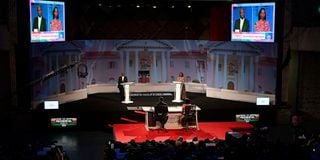Kenyans must take lead in public discourse

Running mates Rigathi Gachagua (UDA) and Martha Karua (Azimio) during their deputy presidential debate at the Catholic University of Eastern Africa in Nairobi, on July 19, 2022. Such debates are some of the most direct engagements that the population have had with politicians at this level.
What you need to know:
- Candidates who are running for the same office should all have the opportunity to meet on the same floor and answer the same questions at the same time.
- Despite valid concern about voter apathy, Kenyans in general are deeply involved in public political debate.
The recent publicly broadcasted political debates, ably arranged and presented by a big media collaboration, have been some of the most direct engagements that the population have had with politicians at this level.
They are commendable, given the logistics of putting together an event with so many moving parts.
The media organisations are usually fierce competitors but have been able to come together and cooperate wonderfully during these momentous times.
Several salient points have been unearthed.
The first is that the media are guilty of creating hierarchies by separating different candidates from engaging with each other despite ballot co-presence.
Candidates who are running for the same office should all have the opportunity to meet on the same floor and answer the same questions at the same time, as much as possible.
It is important for Kenyans to see this sense of equality, instead of the creation of tiers, however much these may be tied to opinion polls.
Campaign finances
The second point is the wide-open opportunity for accountability with regard to campaign finances, private finances, and the use of public funds.
Sources of campaign funds have long been kept secret, and taking the candidate’s word alone regarding their intent is not prudent.
Further, public servants and businessmen who are known to be classed need to demonstrate true awareness of real Kenyan lived experiences.
Merely reciting prices of bread, fertiliser and fuel is not enough, and neither is being sympathetic with words alone.
The needs of Kenyans as the cost of living rises are emergent and immediate.
Any responses to this should demonstrate that, and questions should be geared towards this.
In addition, citing “the budget” as the main source of income for ambitious plans cannot be a valid answer; it is similar to any individual saying they will get money from their pocket.
More specific and tangible answers must be demanded in this regard.
Thirdly, there is the question of the 100-day achievements of candidates that are asked at every debate.
The celebration of the maturing of Kenya’s democracy means that we have more years of evidence and historical analysis to fall back on.
When we do look at the data we have, which candidates actually kept any of their 100-day promises?
Such analysis would further equip the media to either rubbish the 100-day approach or use any successes as reference points when asking these questions, rather than just asking candidates to recite crammed intentions that nobody may hold them to.
Despite valid concern about voter apathy, Kenyans in general are deeply involved in public political debate.
The media should, therefore, keep up their good work, while striving to improve where they can, so that Kenyans, and not the politicians, remain the main characters in these discussions, being the people whose futures are on the line as we move towards August 9.
The writer is a policy analyst. [email protected]




